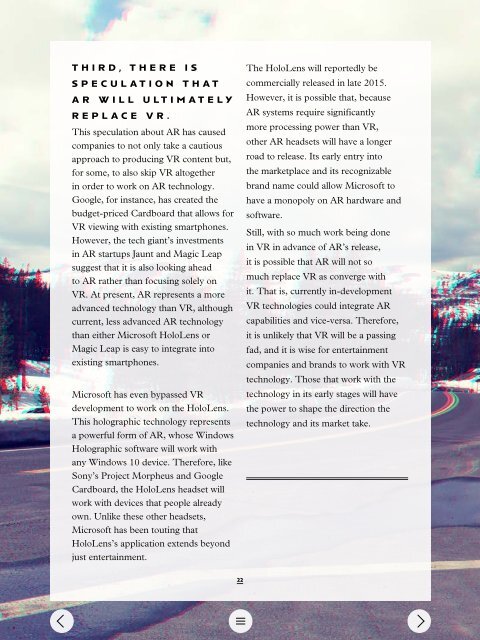V I R T U A L E N T E R T A I N M E N T A N D M A R K E T I N G
0xtfol
0xtfol
You also want an ePaper? Increase the reach of your titles
YUMPU automatically turns print PDFs into web optimized ePapers that Google loves.
Third, there is<br />
speculation that<br />
AR will ultimately<br />
replace VR.<br />
This speculation about AR has caused<br />
companies to not only take a cautious<br />
approach to producing VR content but,<br />
for some, to also skip VR altogether<br />
in order to work on AR technology.<br />
Google, for instance, has created the<br />
budget-priced Cardboard that allows for<br />
VR viewing with existing smartphones.<br />
However, the tech giant’s investments<br />
in AR startups Jaunt and Magic Leap<br />
suggest that it is also looking ahead<br />
to AR rather than focusing solely on<br />
VR. At present, AR represents a more<br />
advanced technology than VR, although<br />
current, less advanced AR technology<br />
than either Microsoft HoloLens or<br />
Magic Leap is easy to integrate into<br />
existing smartphones.<br />
Microsoft has even bypassed VR<br />
development to work on the HoloLens.<br />
This holographic technology represents<br />
a powerful form of AR, whose Windows<br />
Holographic software will work with<br />
any Windows 10 device. Therefore, like<br />
Sony’s Project Morpheus and Google<br />
Cardboard, the HoloLens headset will<br />
work with devices that people already<br />
own. Unlike these other headsets,<br />
Microsoft has been touting that<br />
HoloLens’s application extends beyond<br />
just entertainment.<br />
The HoloLens will reportedly be<br />
commercially released in late 2015.<br />
However, it is possible that, because<br />
AR systems require significantly<br />
more processing power than VR,<br />
other AR headsets will have a longer<br />
road to release. Its early entry into<br />
the marketplace and its recognizable<br />
brand name could allow Microsoft to<br />
have a monopoly on AR hardware and<br />
software.<br />
Still, with so much work being done<br />
in VR in advance of AR’s release,<br />
it is possible that AR will not so<br />
much replace VR as converge with<br />
it. That is, currently in-development<br />
VR technologies could integrate AR<br />
capabilities and vice-versa. Therefore,<br />
it is unlikely that VR will be a passing<br />
fad, and it is wise for entertainment<br />
companies and brands to work with VR<br />
technology. Those that work with the<br />
technology in its early stages will have<br />
the power to shape the direction the<br />
technology and its market take.<br />
22


